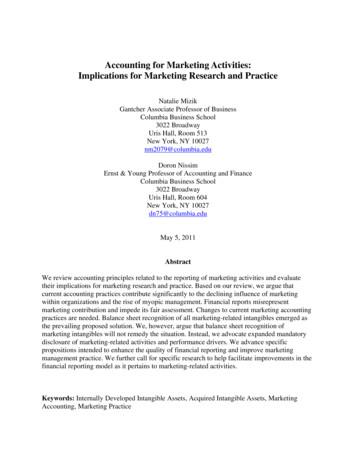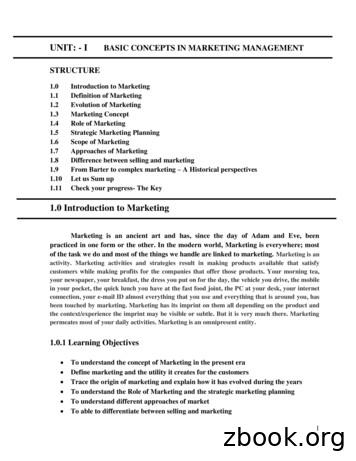Principles Of Marketing - Swastapriambada
Principles of MarketingPrinciples of MarketingKotler & Armstrong: Principles of Marketing, 9th edition1 / 126
Principles of MarketingTable of Contents1 Marketing in a Changing World.51.1 Marketing Model – Core concepts.51.2 Marketing management.61.3 Marketing concepts.81.4 Challenges in the new connected millennium.92 Strategic Planning and the Marketing Process.102.1 Strategic planning process.102.2 Marketing process.123 The Marketing Environment.153.1 Overview.153.2 Microenvironment.153.3 Macroenvironment.173.4 Responding to marketing environment.194 Marketing Research and Information Systems.204.1 General.204.2 Marketing information system (MIS).204.3 Marketing research process.214.4 Other marketing research considerations.245 Consumer Markets and Consumer Buyer Behavior.255.1 Model of consumer behavior .255.2 Characteristics affecting consumer behavior. 255.3 Types of buying decision behavior.295.4 The buyer decision process.305.5 The buyer decision process for new products.305.6 Consumer behavior across international borders.316 Business Markets and Business Buyer Behavior.326.1 Overview.326.2 Business buyer behavior.336.3 Institutional and government markets.357 Market Segmentation, Targeting, and Positioning for Competitive Advantage.367.1 Overview.367.2 Market Segmentation.377.3 Market targeting.397.4 Positioning for competitive advantage.408 Product and Services Strategy.438.1 What is a product?.438.2 Product classifications.448.3 Individual product decisions.468.4 Product line decisions.498.5 Product mix decisions.508.6 Services marketing.518.7 International product and services marketing.529 New-Product Development and Product Life-Cycle Strategies.539.1 New product development strategy.539.2 Product life-cycle strategies.5610 Pricing Products: Pricing Considerations and Approaches.5910.1 Introduction.5910.2 Factors to consider when setting prices. . 5910.3 General pricing approaches.6211 Pricing Products: Pricing Strategies.642 / 126
Principles of Marketing11.1 New-product pricing strategies.6411.2 Product mix pricing strategies.6411.3 Price adjustment strategies.6511.4 Price changes.6811.5 Public policy and pricing.6912 Distribution Channels and Logistics Management.7112.1 The nature of distribution channels.7112.2 Channel behavior and organization.7212.3 Channel design decisions.7412.4 Channel management decisions.7612.5 Public policy and distribution decisions.7612.6 Physical distribution and logistics management.7713 Retailing and wholesaling.8013.1 Retailing.8013.2 Retailer marketing decisions.8313.3 The future of retailing.8413.4 Wholesaling.8513.5 Wholesaler marketing decisions. .8613.6 Trends in wholesaling.8714 Integrated marketing communications strategy.8814.1 The marketing communications mix.8814.2 Integrated marketing communications.8814.3 A view of the communication process.8914.4 Steps in developing effective communication.9014.5 Setting the total promotion budget and mix.9314.6 Socially responsible marketing communication.9515 Advertising, sales promotions, and public relations.9615.1 Advertising.9615.2 Sales promotion.10015.3 Public relations.10116 Personal selling and sales management.10316.1 Role of personal selling.10316.2 Managing the sales force.10316.3 Principles of personal selling.10517 Direct and online marketing: the new marketing model.10817.1 What is direct marketing?.10817.2 Benefits and growth of direct marketing.10817.3 Customer databases and direct marketing.10917.4 Forms of direct marketing.10917.5 Online marketing and electronic commerce.11017.6 Integrated direct marketing.11217.7 Public policy and ethical issues in direct marketing. 11218 Competitive strategies.11318.1 Customer relationship marketing.11318.2 Competitive marketing strategies.11518.3 Balancing customer and competitor orientations.11819 The global marketplace.11919.1 Global marketing in the twenty-first century. .11919.2 Looking at the global marketing environment. 11919.3 Deciding whether to go international.12119.4 Deciding which markets to enter.12119.5 Deciding how to enter the market.12119.6 Deciding on the global marketing program.1223 / 126
Principles of Marketing19.7 Deciding on the global marketing organization.12320 Marketing and society: social responsibilities and marketing ethics.12420.1 Social criticisms of marketing.12420.2 Citizen and public actions to regulate marketing.12420.3 Business actions toward socially responsible marketing.1264 / 126
Principles of Marketing1 Marketing in a Changing World1.1 Marketing Model – Core conceptsMarketingFive core concepts– Needs, wants, demands–Products and services–Value, satisfaction, quality–Exchanges, transactions, relationships–MarketsDefinition of marketing– A social and managerial process whereby individuals and groups obtain whatthey need and want through creating and exchanging products and valuewith others– Simple definition–Deliver customer satisfaction at a profit–By: (1) attracting new customers by promising superior value, and (2) keepcurrent customers by delivering satisfactionScope of marketing– Book has a broad scoping: R&D, communcation, distribution, pricing, service–Also buyers carry on marketing activities – e.g. by searching for goodsMain elements of a modern marketing system – value added in steps– SuppliersNeeds, wants, demands–Company (marketer) competitors–Marketing intermediaries–End user marketNeeds– States of felt deprivation, part of human makeup–Physical and social needsWants– The form needs take (e.g. food hamburger)–Shaped by culture and personalityDemands– When wants are backed by buying powerProducts and servicesProducts– Anything that can be offered to satisfy a need or a want–––Physical products, services, experiences, persons, places, organizations,information, ideasExample: “smoking is bad” idea can be a product, a person can be a product in anelectionAka: satisfier, resource, marketing offerServices– Just one kind of a product5 / 126
Principles of MarketingValue, satisfaction, quality (Customer) Value––Difference between “value gained by owning and using a product” and “cost ofobtaining the product”Value gained not necessarily monetary–Similarly cost of obtaining not necessarily monetary–Customers act on perceived value [and perceived cost](Customer) Satisfaction– Perceived performance relative to expectationsQuality– Closely related to satisfactionExchange, transactions,relationships–Narrow definition: no defects–Broad definition: ability to satisfy customer needs [circular definition!]Exchange– Obtaining a desired object from someone by offering something in return–Offerings could be money, product, service, .Transaction– A trade of values between two parties; marketing's unit of measurement!–Monetary transactions and barter transactionsRelationship (Marketing)– Going beyong short term transactionsMarkets–Long-term relationships with valued customers, partners, etc–Marketing network – company and all its supporting stakeholdersMarket – Economist's definition– Place (virtual or physical) where buyers and sell
Principles of Marketing 1 Marketing in a Changing World 1.1 Marketing Model – Core concepts Marketing Five core concepts – Needs, wants, demands – Products and services – Value, satisfaction, quality – Exchanges, transactions, relationships – Markets Definition of marketing
May 05, 2011 · 3022 Broadway . Uris Hall, Room 604 . New York, NY 10027 . dn75@columbia.edu . May 5, 2011 . Abstract . We review accounting principles related to the reporting of marketing activities and evaluate their implications for marketing research and practice. Based on our review, we argue thatFile Size: 393KBPage Count: 50Explore further(PDF) Strategic Marketing and Marketing Strategy: Domain .www.researchgate.net(PDF) Marketing Management - ResearchGatewww.researchgate.net5 Marketing Management Orientationscommercemates.com5 Marketing Concepts: Marketing Management Philosophieswww.iedunote.comBasic Marketing Principles - Mercer Universityfaculty.mercer.eduRecommended to you b
UNIT: - I BASIC CONCEPTS IN MARKETING MANAGEMENT STRUCTURE 1.0 Introduction to Marketing 1.1 Definition of Marketing 1.2 Evolution of Marketing 1.3 Marketing Concept 1.4 Role of Marketing 1.5 Strategic Marketing Planning 1.6 Scope of Marketing 1.7 Approaches of Marketing 1.8
Marketing Plan Workbook for Independent Professionals Publishing Info 2 Welcome 3 Table of Contents 4 The Eight Marketing Principles 5 1. The Game of Marketing 6 2. Marketing Mindset 10 3. Marketing Messages 16 4. Marketing Conversations 19 5. Marketing Currency 22 6. Marketing Strategies 25 .
1. Understand what a marketing manager does. 2. Know what marketing strategy planning is—and why it is the focus of this book. 3. Understand target marketing. 4. Be familiar with the four Ps in a marketing mix. 5. Know the difference between a marketing strategy, a marketing plan, and a marketing program. 2–2
International Marketing (3) Sales Management (3) Marketing of Financial B2B Marketing (3) Marketing Strategy (1.5) Media Planning ( 1.5) (3)Brand Management (3) Retail Marketing ((3) Marketing Engineering (1.5) Rural Marketing (3) Innovations in Marketing (3) Customer Relationship Management (3) Sales Promotion (3) Marketing for Entrepreneurs
VP Inbound Marketing HubSpot Twitter: @mvolpe. Outbound Marketing. Outbound Marketing 800-555-1234 Annoying Salesperson. Inbound Marketing Blog SEO Social Media. Rethinking Marketing Outbound Marketing Telemarketing Inbound Marketing SEO / SEM Trade shows Direct mail Email blasts Blogging
2 SYLLABUS (G E-4) Principles of Marketing Objective: The objective of this course is to provide basic knowledge of concepts, principles, tools and techniques of marketing. Contents: Unit I: Introduction: Nature, scope and importance of marketing; Selling vs Marketing; Marketing mix,
Superior Court of California County of Imperial “NOTICE OF UNCLAIMED MONIES” I, Maria Rhinehart, Court Executive Officer, Superior Court of California, County of























